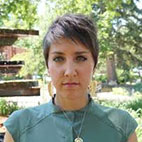
THE WORD OF THE WEEK IS GRAVE
March 22, 2020
Is it coincidence?
It began
a graveyard.
We / erect / began
If we began in the ocean
If lightning never struck
If we were too small for fire
If our hands would not hold /
the cradle or / the string
If we had not stood
If we were not hungry
If we had not nested /
on the edge of / the risen earth
If we were not different
If we were not divided
If we had not fell /
the trees / that might / have held us
If we did not go back to the water /
in our singular skins
If we did not build walls on soft shores /
and paper/bodies—
Qungupet et’ut nunami.[1]
Today the earth shakes.
This week we suspend our games.
Nuna aulakan /
alingnartuq[2] / the spire on the city’s cathedral
reportedly snapped off.
Today we are reminded
how to say grave.
[1] Our graves are on the land.
[2] When the earth shakes / it is frightful.
SHE IS MAKING ROPE
Call it a mess.
Call it a [geological] mess.
Call it a[n historical] mess.
Call it a current
event,
Body a continent
curved
broken
stacked
under the heel of a pre-
Columbus
boot.
You think he was the first?
Birdsong to the preconditioned ear a precursor
to the kind/of curses bundled
finer than spindle/
these days—
that the woman should not know
she has been abused
until there are twins with her own eyes
and someone else’s mouth and ears.
There will always be wicked men and (flip it, if you’d like
weary women just-now’s not the time)
She wouldn’t go quietly into the earth
to fire, to dark after dark.
It’s not true what they say about fish
in/the sea these days
looks like a world with a lot
of dead women, these days
even the birds are at risk.
Who’s vindictive now? Bury the branch
we can’t have for our own.
In decline: sea ice, insects, bearded seals, young
whales, martens on the Oregon coast. Giraffes
hum to each other
through the night
no one noticed:
ARafkumek piliyuq.[1]
Different ways to say the same thing: Still
she has some uses, still/she may have some resources
still she may be ravaged,
her
and all her
pieces— (you must separate the part
from the whole, twist and braid
Adria, are you lost yet? Hum. the line long for casting)
this humming too
a line to bind
to follow when the shore departs.
When vision is impaired we/sound
the other to keep the herd
together—
her, and all her pieces.
[1] She is making rope.
URIITARSURCIQUA[1]
I was looking for a shell
f/or a house to keep
in my pockets
small enough to hold onto
but large enough to fit
my hips (or
was it my lips?
what story doesn’t fill
with holes?)
uriitarsurciqua,
curved on one side
flat on the other
like a boat
(in this telling even the mice
are spared—they floated
across the water and became
stuck on rocks
they became uriitat[2]—they didn’t
drown, though children
these days
eat them raw)
I wanted it to be blue
for my mother I suppose
(the house)
I wanted my mother
to approve
but each one I found already
was living and
I dropped each piece
that moved.
When we were children
we had four hermit crabs and my sister
killed two.
She threw them against the brick
fireplace when they moved.
After that we didn’t pick them up.
After that we didn’t hold them.
We stopped feeding the two that remained.
We expected our parents to fix them.
We expected our parents to protect
their investment.
We expected our parents to remove the bodies
while we slept.
We didn’t know how to fashion our small ribs
into boats.
[1] I am going to get some bidarkies.
[2] chiton, otherwise bidarkies, otherwise the shape of a traditional skin boat.
ARNAT QUTMI KATURTUT
Qawallria alqaqa.
Qawallria maamaqa.
Imaq qawallria.
Ilangartuten, ilangartuten—
Kuigmi agtutut/
Ap’sgu
Cestun lla et’a?
Pinartuq-qaa?
Llaatsurtaalliit—
Qitenguq.
Qitengkutaruq.
Imasuugukut
imamek
Tumanaq martuq:
sapuraangukut
Macamek tang’rpakartaan’itukut.
Maaninguall’raq tang’rpakartaan’itukut
macamek.
Illianga
qitemi
uyaqurtulikun ikegtaartut
tang’rmuq
Aturyugllianga/
Aturyugua—
Isiit awa’i angitut/
lingalasinaq
[ikirngaut]
Iqsaka narya’aliyaqa
aturkutartua—
taisgu arnat guamnun (englupet),
*
Uswilraraat qawarn’itut nuutan
Taugna ikani/
imasuugukut
Ipigpet awa tukniya’utut
Kuigmen agllriakut:
Akarngasqangcugmek pilirluku ( )
Et’ua qutmi,
Alqaqa imami et’uq
Maamaqa imami et’uq
Kayunguq
cali qayaq miktuk
kesiin qangyut
angtaartut—
Arnat qawarn’itut.
Arnat qutmi et’ut.
Iqsaka narya’aliyaqa
*
Paniyaqa qiacin’ituq.
Carliaqa llangllarngauq.
ARafkumek piliyuq
katurkut
Paniyaqa aturkutartuq.
ARafkumek piliyuq.
Aturciqukut—
Kelugkanek aturtaartukut mingqu’akamta:
Taangaq et’uuq
Carwaq tukniuq
(Suuget ilait niu’uqurtaarait Nanwam suugi ell’uni)
Quliyangua’uciikamken
[imami]
aturciqukut.
THE WOMEN ARE GATHERING AT THE BEACH
My sister was sleeping.
My mother was sleeping.
The water was sleeping.
Wake, repeat—
Begin [at] the river/
Ask
How is it outside?
Is it fair? (Is it nice?)
They say we used to know
which way the wind would blow—
It is raining.
It will rain.
We are searching for our contents
for that we will contain
The fog is thick: tie a feather
to the prow
Now we do not see the sun.
Here (pitifully) we do not see
the sun.
I [am one /who] was born
in the rain
not many loons
to see through
I used to want to sing/
I want to sing—
The owls have returned/
their knowing eyes
[open]
Put bait on my hook
where the birds gather
I will sing—
bring the women home,
*
The children are not sleeping now
Those ones there out of reach/
[we] are looking for the sea
Our arms now are getting weak
We went to the river:
mark a dot to follow/
see
I am on the beach,
My sister is in the water
My mother is in the water
It is stormy
and the kayak is small
but the wave
will be great—
The women are not sleeping.
The women are at the beach.
I am putting bait on my hook/
[where we gather]
*
My daughter will not cry.
My daughter will not sleep.
She is making rope
[where] we gather
My daughter will sing soon.
She is making rope.
We will sing—
Thread the needle:
The water is deep
The current is strong
(If I were not afraid I’d be/a fish)
I will tell you a story
[in the water]
we will sing.
